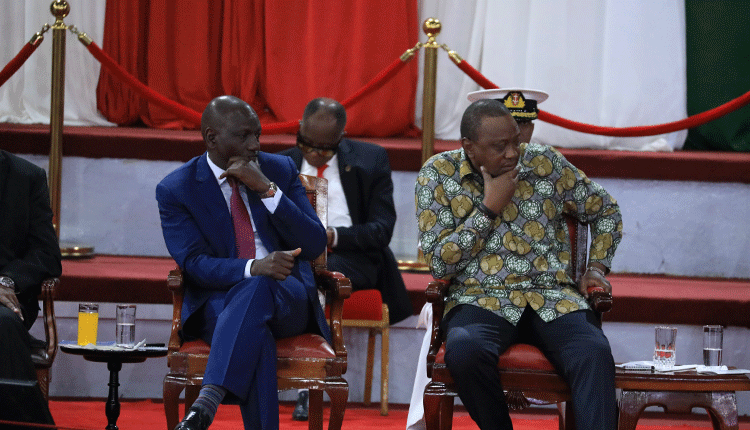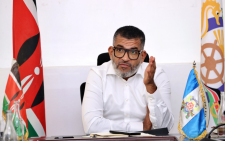Why efforts to reunite Uhuru, Ruto flopped

Efforts by the clergy to reconcile President Uhuru Kenyatta and his friend-turned-foe Deputy President William Ruto seem to have hit a brick wall with a section of clerics terming their differences “deep-rooted”.
The religious leaders who had begun the initiative sometimes last year before their efforts were temporarily disrupted by the Covid-19 pandemic, are, however, hoping they can still broker a deal between the two leaders.
Yesterday, the Kenya Conference of Catholic Bishops (KCCB) led by its chair and Mombasa Archbishop Martin Kivuva regretted that the differences between the duo could further escalate among their supporters and sow seeds of discord.
“It is an open and sad reality that the President and Deputy President of the Republic of Kenya are not reading from the same script.
The public exchanges that are being witnessed are dangerous for the prevailing peace and tranquility in the country and cannot be taken lightly,” said Nyeri Archbishop Anthony Muheria, who has been part of the team of clerics pushing for a ceasefire.
Reconciliation efforts
The prelate further regretted that the differences between the two top leaders were already creating anxiety among Kenyans and have potential to ignite political violence if not addressed immediately.
“We are deeply concerned that if this open disagreement between the President and the Deputy President is taken up by their supporters, the trickle-down effect it could generate across the country will be dire to even contemplate.
We call upon the President and his deputy to seek ways of reconciling and working together for the sake of the unity of our country,” said Muheria.
Retired African Inland Church (AIC) Bishop Silas Yego and Archbishop Muheria, have quietly been working alongside the head of the Anglican Church of Kenya Archbishop Jackson ole Sapit, Kisumu Catholic Archbishop Philip Anyolo and Bishops David Oginde (retired head of Christ is The Answer Ministries, CITAM) and Robert Lang’at of African Gospel Church (AGC) to reconcile the two politicians.
Sources within the team, who declined to be named due to the sensitivity of the matter, intimated to People Daily that efforts to reconcile the two leaders had “almost collapsed” because of apparent irreconcilable differences between them.
While President Kenyatta reportedly complains of being slighted by his deputy, Ruto has allegedly been accusing his boss of shortchanging him on their 2013 deal as well as not recognising and appreciating the role he played in his election to State House.
The source said President Kenyatta has never been comfortable with his deputy’s claim to a “shared presidency” and exploiting the 2010 Constitution that gives him immunity from being sacked, to allegedly disrespect the Head of State.
“Theirs is a problem that seems to have began simmering almost six years ago before it erupted publicly in 2018. The differences have to do with something much bigger than what we know,” said the source.
Last week, Archbishop Muheria is said to have met the President and Ruto separately to bring them together for a face-to- face meeting before the other clerics.
“The meeting did not achieve much after both sides stuck to their hardened positions and declined to cede ground despite the spirited persuasion from the archbishop. But we have not given up,” the source added.
The bad blood between the two appears to have begun in 2018 when Uhuru entered into a truce with his 2017 presidential rival, ODM leader Raila Odinga.
The move resulted in the formation of the Building Bridges Initiative (BBI) Task Force charged with looking into a nine-point agenda that would have birthed amendments to the Constitution through a national referendum.
Since then, Ruto took a divergent route from his boss, as he traversed the country voicing opposition to the proposals contained in the BBI document, among them the expansion of the Executive.
Political intolerance
Now, with the collapse of BBI following a Court of Appeal judgment, the clerics feel the two erstwhile friends should bury their differences and work together for the sake of the country’s development and unity.
“It is important that there is unity among the top leaders as this gives confidence to the people,” said Muheria, adding that as church leaders they are ready to step in and mediate a truce.
When contacted yesterday, Bishop emeritus Oginde said the matter is sensitive and cannot be discussed openly with the media.
“I can confirm that the talks have been ongoing. But the issues are too sensitive to be discussed with the media,” said Oginde.
At the same time, the clerics called on the National Cohesion and Integration Commission (NCIC) to take action against all politicians spreading ethnic hatred and divisions through their political pronouncements.
“We have noted an increase in incidences of political thuggery and intolerance in our country. We, therefore, call on politicians to exercise sobriety and tone down on political rhetoric.
Nobody, irrespective of his or her position or political leaning, should be allowed to threaten the lives of Kenyans in pursuit of his or her political ambitions and goals,” said Kivuva.
“We remind our leaders that if we continue along this path of ethnic mobilisation and balkanisation, we are exposing this country to serious danger. Time has come for us to introduce maturity and discipline in our politics.”
Kivuva further called on Kenyans to desist from following political leaders blindly, adding that they must not allow themselves to be manipulated by leaders to engage in violence or perpetuate negative ethnicity.
“Elections come and go but our country will remain. We should not destroy this country to satisfy the unbridled ambitions of a few politicians,” he said.
The clerics had in the past few months engaged Uhuru and Ruto with the hope of reconciling them.
Sources confided in People Daily that the President’s concern is about alleged disrespect from his deputy and has also not been comfortable with the manner in which the latter was pushing him to endorse him for the 2022 presidential poll as a reciprocation for their 2013 and 2017 partnership.










